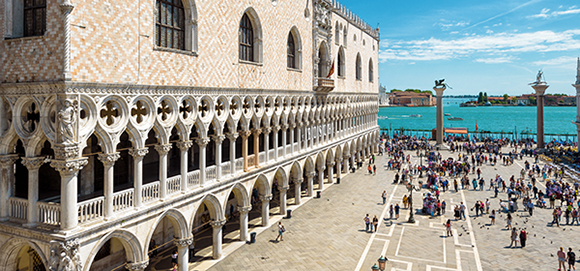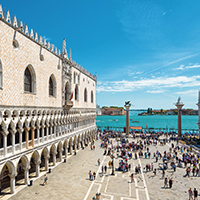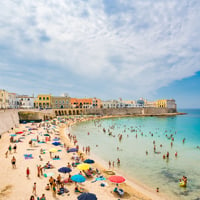Moving to Venice, Italy
Last updated on Jan 09, 2024
Summary: Moving to Venice, Italy? Expats talk about what you need to know before moving to Venice.

What do I need to know before moving to Venice?
When we asked people what advice they would give someone preparing to move to Venice, they said:
"Venice is a city built on water, so getting around will often involve boats, whether it's the public vaporetto service or private water taxis. The city is divided into six districts, or "sestieri", each with its own unique character and charm. The cost of living in Venice is quite high, with groceries, dining, and housing all tending to be more expensive than in other Italian cities. Venice is a popular tourist destination, so it can get crowded, especially during the peak summer months. The city's population is declining, and many locals speak English, but learning Italian will help you integrate and understand the culture better. The healthcare system in Italy is good, but it's advisable to have comprehensive health insurance. Venice is prone to flooding, especially in the autumn months, so it's important to be prepared for this. The city has a rich and vibrant cultural scene, with plenty of museums, galleries, and festivals taking place throughout the year. Despite being a small city, Venice has a diverse food scene, with plenty of seafood and local Venetian dishes to try. Venice has a humid subtropical climate, with hot, humid summers and cold, wet winters. The city is very safe, but like any tourist destination, it's important to be aware of pickpockets. Finally, while Venice is a beautiful and unique city to live in, it's also fragile and faces numerous environmental challenges, so it's important to live sustainably and respect the city's rules and regulations," replied a member in Venice.
How do I find a place to live in Venice?
We asked expats how they chose their neighborhood and found a place to live. They answered:
"Finding a place to live in Venice, involves several steps. First, you need to determine your budget and the type of accommodation you're looking for. This could range from a small apartment to a larger house, depending on your needs and financial situation. Next, you should research different neighborhoods in Venice to find one that suits your lifestyle and preferences. Some popular areas include San Marco, Dorsoduro, and Cannaregio. Each neighborhood has its own unique character and amenities, so it's important to visit them in person if possible. Once you've identified a few potential neighborhoods, you can start looking for available properties. There are several online platforms that list rentals and properties for sale in Venice, such as Idealista, Immobiliare, and Casa.it. These websites allow you to filter your search based on location, price, size, and other features. In addition to online listings, you might also want to consider hiring a real estate agent. They can provide valuable local knowledge, help negotiate prices, and guide you through the legal process of renting or buying a property in Italy. When you find a property you're interested in, arrange a viewing with the landlord or real estate agent. This is your opportunity to inspect the property, ask questions, and get a feel for the neighborhood. If you decide to proceed with a property, you'll need to negotiate the terms of the lease or purchase agreement. This will include the price, move-in date, and any other conditions. In Italy, it's common to pay a deposit of one to three months' rent. Finally, once the agreement is signed, you'll need to register your new address with the local authorities. This is usually done at the local town hall or police station. You'll need to bring your passport, the lease or purchase agreement, and proof of employment or income. Remember, finding a place to live in Venice can take time and patience, so it's important to start your search well in advance of your planned move date," explained one expat living in Venice, Italy.
What is a typical expat home or apartment like in Venice?
"A typical expat home or apartment in Venice, is often a blend of traditional Venetian architecture and modern amenities. These homes are usually located in historic buildings, with features such as high ceilings, exposed wooden beams, and terrazzo flooring. The living spaces are often compact yet efficiently designed, reflecting the city's high population density and limited space. Many apartments have large windows or balconies that offer stunning views of the city's canals, bridges, and historic landmarks. The interiors are typically furnished with a mix of classic Italian furniture and contemporary pieces, creating a comfortable and stylish living environment. The kitchen is usually small but well-equipped, with modern appliances and plenty of storage space. The bedrooms are often cozy and inviting, with comfortable beds and high-quality linens. The bathrooms typically feature Italian marble and high-end fixtures. Despite the historic nature of many buildings, most expat homes in Venice are equipped with modern conveniences such as air conditioning, heating, and Wi-Fi. Some apartments may also have access to shared amenities like a rooftop terrace or a private courtyard. Given Venice's unique geography, many expat homes are located within walking distance of local shops, restaurants, and cultural attractions. However, owning a car is not common due to the city's extensive network of canals, so most residents get around by foot, bicycle, or public water transportation. Overall, living in an expat home in Venice offers a unique opportunity to experience the city's rich history and culture while enjoying a comfortable and modern lifestyle," commented one expat who made the move to Venice.
What is the average cost of housing in Venice?
If you are thinking about moving to Venice, cost of living in probably a key consideration. Expats commented about the cost of housing:
"The average cost of housing in Venice can vary greatly depending on the location and size of the property. As of recent data, a property in the city center can cost around 4,000 to 7,000 Euros per square meter. However, in less central areas, the price can drop to around 2,500 to 3,500 Euros per square meter. For rental properties, a one-bedroom apartment in the city center can cost around 700 to 1,200 Euros per month, while the same outside the city center can cost approximately 500 to 800 Euros per month. Please note that these prices are subject to change and can fluctuate based on the real estate market," remarked one expat who made the move to Venice.
Should I buy or rent a home in Venice?
If you have not spent a lot of time in Venice, you should rent before even thinking about buying. We asked expats there about the buy vs. rent decision:
"The decision to buy or rent a home in Venice, largely depends on your personal circumstances, financial situation, and long-term plans. If you plan to stay in Venice for a long period, buying a home could be a good investment. Owning a property in Venice can provide you with a sense of stability and the freedom to customize your living space. However, buying a home in Venice can be quite expensive, and the process can be complex, especially for foreigners. It also comes with additional costs such as property taxes, maintenance costs, and insurance. Therefore, you need to ensure that you have the financial capacity to handle these expenses. On the other hand, renting a home in Venice offers more flexibility. It's a good option if you're not planning to stay permanently or if you're unsure about your long-term plans. Renting can also be more affordable in the short term, as it doesn't require a large upfront investment. However, when you rent, you're not building equity in a property. You also have less control over your living space, as you need to follow the rules set by your landlord. In conclusion, both buying and renting a home in Venice have their pros and cons. It's important to carefully consider your financial situation, lifestyle, and long-term plans before making a decision. Consulting with a real estate professional can also be helpful in making an informed decision," commented one expat who made the move to Venice.
What should I pack when moving to Venice?
We asked people living in Venice to list three things they wish they had brought and three they wish they had left behind. They responded:
"When moving to Venice, you should pack a variety of clothing to accommodate the city's varying weather conditions. This includes lightweight clothing for the hot, humid summers, as well as warmer clothing for the cooler winters. Waterproof clothing, such as raincoats and boots, are also essential due to the city's frequent flooding. Comfortable walking shoes are a must, as Venice is a pedestrian city with many cobblestone streets. You should also pack a good quality sun hat, sunglasses, and sunscreen to protect yourself from the sun, especially during the summer months. Don't forget to pack your toiletries, prescription medications, and any other personal care items you use daily. However, keep in mind that Venice has plenty of stores where you can purchase these items if needed. Bring along your important documents, such as your passport, driver's license, and any necessary visas or work permits. It's also a good idea to have copies of these documents in case they get lost or stolen. If you plan on cooking at home, you might want to pack some of your favorite non-perishable food items, as they may be hard to find in Venice. Lastly, consider packing a voltage converter and adapter plugs for your electronics, as the electrical outlets in Italy are different from those in many other countries. Remember, Venice is a city with many bridges and stairs, so try to pack as lightly as possible to make your move easier," remarked one expat who made the move to Venice.
 Italian For A While
Italian For A WhileConnect
Become ‘Italian for a While’ with IFA! Learn in Italy on a 1-week to 12-month program - open to students, young adults, graduates, digital nomads, professionals, groups, faculty-led programs, and more. Take courses at an accredited school while immersing yourself in the language, life, and culture among your international peers. Submit an inquiry with IFA to learn more.
Click connect to have our partner contact you via e-mail and/or phone.
 Italian For A While
Italian For A WhileBecome ‘Italian for a While’ with IFA! Learn in Italy on a 1-week to 12-month program - open to students, young adults, graduates, digital nomads, professionals, groups, faculty-led programs, and more. Take courses at an accredited school while immersing yourself in the language, life, and culture among your international peers. Submit an inquiry with IFA to learn more.
Connect
Click connect to have our partner contact you via e-mail and/or phone.
What cultural faux pas should I try to avoid making in Venice?
We asked people in Venice if they could share any humorous cultural blunders they commited. For new expats, keep in mind that these incidents are an inevitable part of expat life. Learning to laugh about them is the key!:
"When visiting Venice, it's important to respect the city's cultural norms and traditions. Avoid touching or leaning on the city's historic structures, as they are often fragile and can be damaged easily. Don't feed the pigeons in St. Mark's Square, as it's illegal and can result in a fine. Avoid eating or drinking while walking around, as this is considered impolite. Instead, take the time to sit down and enjoy your meal or drink. Similarly, don't eat or drink in public places like churches or museums. When visiting churches, dress modestly and cover your shoulders and knees. It's also considered disrespectful to take photos inside most churches. Don't swim in the canals, as it's not only illegal but also unsafe due to the water quality. Avoid using a gondola for transportation, as they are typically used for tourist sightseeing and can be quite expensive. Instead, use the public water buses known as vaporettos. Finally, try to learn a few basic phrases in Italian. While many Venetians speak English, they will appreciate your effort to communicate in their language," remarked one expat in Venice, Italy.
About the Author
 Betsy Burlingame is one of the founders of Digital Nomad Exchange and the Founder and President of Expat Exchange. She launched Expat Exchange in 1997 as her Master's thesis project at NYU. Prior to Expat Exchange and Digital Nomad Exchange, Betsy worked at AT&T in International
and Mass Market Marketing. She graduated from Ohio Wesleyan University
with a BA in International Business and German.
Betsy Burlingame is one of the founders of Digital Nomad Exchange and the Founder and President of Expat Exchange. She launched Expat Exchange in 1997 as her Master's thesis project at NYU. Prior to Expat Exchange and Digital Nomad Exchange, Betsy worked at AT&T in International
and Mass Market Marketing. She graduated from Ohio Wesleyan University
with a BA in International Business and German.
Some of Betsy's articles include 12 Best Places to Live in Portugal, 7 Best Places to Live in Panama and 12 Things to Know Before Moving to the Dominican Republic. Betsy loves to travel and spend time with her family. Connect with Betsy on LinkedIn.

Get a quote in 2 minutes from our partner, Cigna Global Health.
Get Quote
Learn about the Digital Nomad Visa for Italy and what is involved in obtaining one. This is one of the most important aspects of moving to Italy as a digital nomad.
![]() Italy Forum
Italy Forum
Talk with other digital nomads and expats in Italy on our Italy forum - meet people, get advice and help others.
![]() Contribute
Contribute
Help others in Italy by answering questions about the challenges and adventures of living in Italy.
Digital Nomads in Italy offer advice about healthcare, hospital visits, emergency rooms visits, finding a doctor and buying health insurance in Italy.

 Venice, Italy
Venice, Italy


